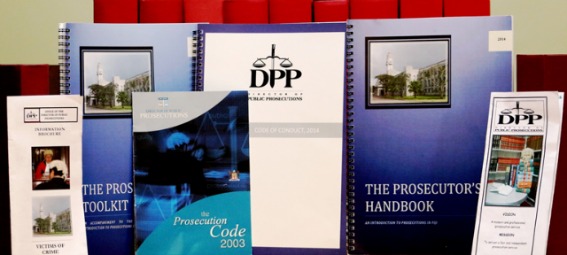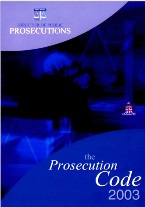Prosecution Policy
With the enactment of the Constitution in September 2013, the ODPP is in the process of drafting a revised Prosecution Code to replace the Prosecution Code, 2003.
The Prosecution Code is an important guidance tool for our prosecutors to aid them in their day to day decision making.
View the ODPP Prosecution Code, 2003.
Decision to Prosecute
No person in Fiji shall be prosecuted unless there is sufficient evidence and it is in the public interest to prosecute.
The first step in the decision-making process is to be sure that there is a reasonable prospect of a conviction. This is an objective test, which includes an assessment of the reliability of evidence, and the likely defence case.
The test is, whether a court, properly directed in accordance with the law is more likely than not, to convict the accused of the charge alleged.
There are two stages that the prosecutor’s analysis of the brief must address in arriving at a decision to prosecute. These stages are the evidential stage and the public interest stage.
Sufficiency of Evidence
A prosecutor must first be satisfied that there is sufficient evidence to provide a ‘reasonable prospect of conviction’ against each accused person on each charge proffered.
The prosecutor must consider the admissibility and reliability of each piece of evidence contained in the brief.
The prosecutor must also consider the likely defence case and assess the likely effect this may have on the prosecution case.
In assessing whether or not there is sufficient evidence to provide a reasonable prospect of conviction, the prosecutor must objectively consider whether or not a judge, assisted by assessors properly directed in accordance with the law, or a magistrate, will more likely than not convict the accused person of the charge alleged.
If the answer is yes, then the charge can proceed. If the answer is no, then it must not go ahead, no matter how important the case or serious the charge itself may be.
The Public Interest
If the prosecutor assesses that there is sufficient evidence to sustain criminal proceedings, then the prosecutor must decide whether or not a prosecution is needed in the public interest.
The prosecutor must balance factors for and against prosecutions fairly and objectively. Generally, criminal proceedings will be instituted unless the factors against prosecutions are clear and cogent.
Drafting Criminal Charges
Prosecutors are bound by legal and ethical obligations which govern their conduct as State Prosecutors. State Prosecutors select charges which:
(b) give the court adequate sentencing powers;
(c ) enable the case to be presented in a clear and simple way; and
(d) adequately reflect the true criminality of the offender’s conduct.
(Paragraph 8 Prosecution Code, 2003)
Prosecutors cannot continue with more charges than are necessary. They cannot lay more charges than are necessary just to encourage an accused to plead guilty to a few.
They are also ethically bound to ensure a more serious charge is not laid just to encourage an accused to plead guilty to a lesser charge.
No person in Fiji shall be prosecuted unless there is sufficient evidence and it is in the public interest to prosecute.





